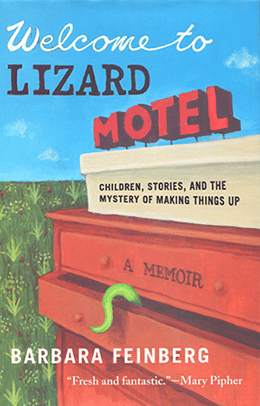There is a special period of … childhood, approximately from five or six to eleven or twelve — between the strivings of animal infancy and the storms of adolescence — when the natural world is experienced in some highly evocative way … It is principally to this middle age range … that writers say they return in memory in order to renew the power and impulse to create. —Edith Cobb
 Welcome to Lizard Motel: Children, Stories,
Welcome to Lizard Motel: Children, Stories,
and the Mystery of Making Things Up, A Memoir
Barbara Feinberg
Beacon Press, 2004
At first glance, Welcome to Lizard Motel, with its cover illustration of a bureau and a lizard’s tail (presumably) sticking out of one drawer, seems an unlikely book about children’s literature. That’s what I thought when I saw it on the education shelf in Borders. The subtitle, though, Children, Stories, and the Mystery of Making Things Up, reeled me in.
Feinberg begins her memoir on a day in which her twelve-year-old son must read a Newbery-winning novel as his summer assignment. He hates the book, hated the book he had to read the summer before (another Newbery medalist). She takes her son to the pool and learns from his friends that they all despise those books. Feinberg decides to read them herself.
The first third of Lizard Motel is devoted to Feinberg’s thoughts about “problem novels,” popular in the 70s and still going strong in more literary iterations through the 80s to the mid-90s. Lyrical writing pulls her through many narratives, but she feels depressed by the bleak endings. “Don’t you think there’s an excessive amount of angst [in modern children’s books]?” she asked a librarian. “Weren’t our books cozier?” She remembers reading Anne of Green Gables and Eleanor Estes’ The Hundred Dresses, books that didn’t shy away from harsher realities, but didn’t cheat the reader. She takes to task books such as The Pigman, Don’t Hurt Laurie, Steffie Can’t Come Out to Play, Dicey’s Song, Bridge to Terabithia, and others that feature trauma.
Feinberg’s views spark controversies. She rails against children’s books as teaching tools. “As a tool to further the notions of, say, multiculturalism, an approach that could be deliciously rich, but which seemed never able to move freely, since the strict humorless watchdog of Political Correctness was always nipping at its heels.”
When her seven-year-old daughter invites Feinberg to her school for a presentation of class writing, Feinberg examines the Writing Project then headed by Lucy Calkins at Columbia University’s Teachers College. Her daughter’s class had been instructed by a graduate from that program, who had the students write memoirs. Each child’s first-person story was in the vein of, “My mother always cooked vanilla pudding for me” or “My father put me to bed every night.” The past tense made the stories sound like eulogies, as if “this moment we are sharing together has vanished.” Young children don’t naturally reflect on their pasts. One boy said he’d rather write about haunted houses than his terminally ill sister.
Comments on Lizard Motel range from “poor execution” to “delightful.” Some argue the merits of a parent writing about children’s literature, apparently forgetting the book is a memoir and why shouldn’t parents discuss what their children are reading? Sandwiched between problem novels and the Writing Project is Feinberg’s own childhood, the books that “pulled her out from some shadow I hadn’t known I’d been hiding in,” and, best of all, a program she began called Story Shop. I longed to be one of those lucky kids who came weekly to the rented church basement to write and create.
Should this book be in children’s literature collections? Maybe, if you enjoy prose like this: “I was charmed that the tiny chairs [from her Story Shop room] cast their own shadows, and each time I left and came back, I felt that someone had just been, a moment before, sitting in the chairs. Once or twice I wondered if it might be the chairs themselves that were alive …” Maybe, if you believe an “outsider” can express the view that not all children want to read sad, realistic fiction.
This book reminded me that when I was a kid, we had no assigned books, only the freedom to choose whatever we wanted. I browsed the library shelves, avoiding any book with an N sticker, indicating a Newbery winner. To my nine-year-old self, those books were like medicine.
As a children’s writer, Feinberg’s book made me want to write a Valentine to all the books I’d loved as a child. So, I wrote my own memoir for my master’s thesis in children’s literature. Yet my Valentine, begun in joy, turned dark as my traumatic childhood crept in. I didn’t write the book I wanted to. After re-reading Welcome to Lizard Motel, I hope one day to pay proper tribute to the books that changed my life, minus the doom and gloom.
